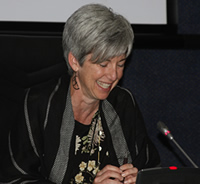International Health Regulations Risk Communication Workshop, Pretoria, South Africa

South Africans from national and provincial Departments of Health and other health-related organizations gathered to participate in a two-and-a-half day hands-on workshop on risk communication in Pretoria, South Africa.
This week seventy-five participants from all corners of South Africa gathered to learn about health risk communication. Four communications specialists from the U.S. Centers for Disease Control and Prevention (CDC) led a hands-on workshop adapted from the World Health Organization. Representatives from provincial and national Departments of Health, Defense, and Agriculture, the National Institute for Communicable Diseases, and other related governmental and non-governmental organizations participated in lively discussions on how to deal with a mock outbreak that steadily worsened.
On the first day, one participant commented “I learnt so much from U.S. CDC today. I learned that communication can build or destroy trust in an instant.” The communicators, health promoters, and communicable disease coordinators partnered to gather information, decide on key messages, build in transparency and trust for the public, and disseminate information. This workshop has laid the foundation for the development of a South African risk communication plan, and has also served to highlight the importance of emergency communication. As one scientist said, “I never realized how important communication is to public health. I’ve learned the role of communication is vital.”

Risk communication is vital and all emergencies are local. To respond to health threats quickly, we must build on our relationships, learn to collaborate and prioritize, and deliver important, timely health messages to the public. Communicators are on the frontlines and at the heart of responding to any health emergency. Dr. Nancy Knight, Country Director, CDC South Africa

Communication is central to any emergency response. It is essential to preventing panic and overreaction among our population … but it is critically important to deal with it proactively rather than reactively.” Dr. Frew Benson, Director, Communicable Diseases Cluster, South African National Department of Health.

We thank CDC Atlanta for building our capacity with this workshop risk communication. This workshop has really laid the foundation of our collaborative work on our forthcoming risk communication plan.” Nombulelo Leburu, Communications Director, South African Department of Health